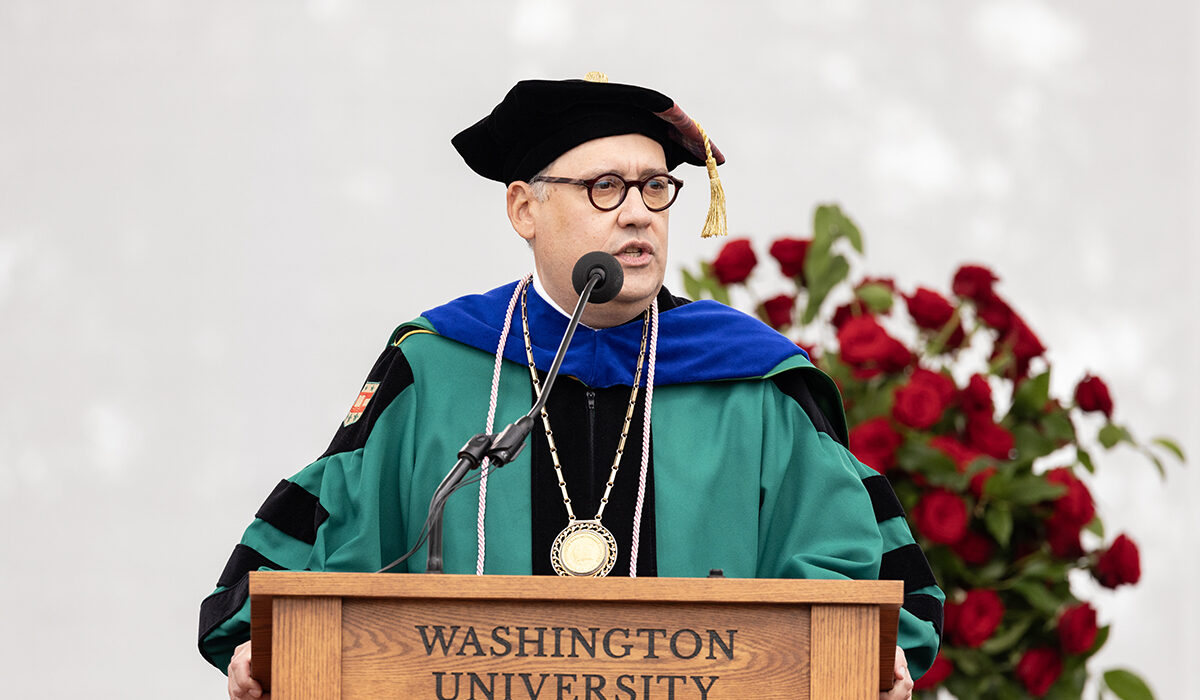Chancellor Andrew D. Martin delivered his message to the Class of 2024 at Washington University in St. Louis during the May 13 Commencement ceremony on Francis Olympic Field.
Below are Martin’s prepared remarks to the graduates.
Class of 2024, congratulations. Everyone on this stage — our administrators, faculty leaders and trustees — and everyone who showed up to support you today — all stand in awe of what you’ve overcome as a class to make it to this milestone. Your experience has been uniquely challenging in so many ways. I mean, who else can claim that their very first act as a college student was to spit in a tube to send a saliva sample off to a lab?
Many of your high school graduation ceremonies were stolen from you by the pandemic. I am grateful — so grateful — that we are able to be here today to reclaim some of what was lost … to allow you, your families and loved ones to experience this most meaningful rite of passage, standing shoulder to shoulder with dear friends to celebrate your Commencement.
And you had a bumpy start to college as well. As I recall, your first days on campus were more chaotic and awkward than Stifler’s mom after one too many Jell-O shots … Now, we all did our best to get you here smoothly and safely, and I’m proud of what we pulled off, but to be real, that whole academic year was like a thick Russian novel. Just when we thought the story was winding down, another hundred pages appeared. And now the frightening days of the pandemic are behind us, but new tumult has emerged, new fears and uncertainty and obstacles. More chapters.
Your Russian novel of a WashU experience includes a number of seismic world events, all of which deeply color your experience here. And even here on campus, your college journey was anything but typical. You had an all-singles residential experience, upended or canceled university traditions, never-ending Zoom fatigue, difficult discussions around Greek life and the launch of ChatGPT. Unprecedented times, indeed!
Just as the great novels of Russia laid bare the societal upheaval and human struggles of their eras, your college experience has immersed you in the complexities and conflicts of our modern world in a way that’s unique to the Class of 2024. Today, I would like to make the case that you have been given an important head start by grappling with some incredibly difficult concepts during your college years. And that will serve you well as you step out of the WashU bubble and into the wider world. Like the richly drawn characters from the pages of Dostoevsky and Tolstoy, you have been challenged, shaped and ultimately fortified by your trials.
I believe that the last four years have required you — have required all of us, really — to think deeply about our core principles. These are the bedrock values that define who you are. They represent your fundamental beliefs about what is important, ethical and worth upholding. These are not to be judged as right or wrong; rather, they are simply the unwavering tenets that make you YOU. These are the values that don’t shift based on context. They guide your integrity, decision-making and sense of purpose.
For example, a person might be comfortable sacrificing certain elements of their physical health in order to achieve a professional calling. While they may value both health and achievement, their value of achievement may be core to their purpose in a way that their physical health is not. For others, the opposite is true. But neither is to be judged as right or wrong.
Defining your core principles also helps you live and lead effectively with limited data. The pandemic forced us all to make decisions and navigate uncertainty with incomplete or changing information. Public health guidance seemed to shift weekly as knowledge about COVID-19 emerged. You learned firsthand what it means to assess situations using the best available facts while realizing those facts could soon be revised.
This baptism-by-fire into decision-making amid ambiguity is an experience commonly delayed until later in adulthood. However, you gained this critical life lesson about rigorously analyzing incomplete data, respecting the limits of current knowledge, and still taking calculated action to move forward, rather than simply following the crowd. And finally, the exercise of defining your core values will contribute to your success by helping you own your decisions fully — including the potential consequences, both positive and negative.
During college, you likely had to do this many times. At some point, each of you had to choose a major. You had to weigh multiple core values and priorities, such as financial stability and desired impact. Or maybe you found yourself overextended at some point, needing to weigh your love for your sport or club against your value of self-care. Perhaps you had to choose between standing in a long line at Corner 17 and being on time to class.
In these cases, you may have considered your parents’ or teammates’ or professor’s opinions, but you alone will reap the rewards or live with the consequences. And we’ve certainly seen this at play on our campus these past few weeks. You witnessed firsthand how choices played out through your own experiences or those of your peers. Everything costs something; everyone has a different idea of what they’re willing to pay.
Let me say that again: everything costs something; everyone has a different idea of
what they are willing to pay. When you internalize this truth, and when you have deeply considered your core values, I believe this mindset can be truly empowering. When faced with a difficult choice, some people can become paralyzed by indecision or lack of information. They might place too much value on other people’s opinions, or they could despair at limitations. Those who are solid in who they are and who they want to be, though, can focus instead on the possibilities and move confidently in a direction that aligns most closely with their core values and principles.
With clarity about what you are willing to sacrifice and what you cannot compromise, difficult decisions become navigable. The discernment between what is sacrosanct and what can bend — without snapping — is crucial for leading a life of principle while remaining effective. The path forward may not be easy, but it has integrity … a life lived authentically and with intention, mindful of the costs yet unflinching in pursuit of what matters most.
So, too, does this mindset help you approach others’ decisions with more empathy.
When you deeply understand that every choice carries costs and trade-offs based on
individual values and priorities, it becomes easier to withhold judgment. You recognize
that people are navigating their own complex webs of sacrifices, limitations and deeply
meaningful ideals.
What may appear inexplicable or even objectionable from the outside may, in the
context of that person’s circumstances and ethics, reflect a genuine effort to live with
integrity. With this perspective, you can explore others’ choices compassionately — not
necessarily to agree, but to understand and acknowledge the humanity behind them. This empathetic lens does not require you to compromise your own firmly held principles. In fact, having wrestled authentically with your values and the costs you’ll bear equips you to extend that same appreciation to others. You avoid projecting your conception of what matters most and can be curious about the ideals that shaped another’s path.
The great Russian novelists had an uncanny ability to depict the vast breadth of human
experience — the tumult of emotions, the wrestling with purpose, the sacrifices demanded by love. At their core, these sweeping stories illuminated the personal and societal impacts of the choices everyone must make. As you carry your great intellects into the world, so, too, do you carry your core principles, and staying in touch with them will help you find the place you belong. If life leads you down a rocky path, you can always return to these values to help you find your way home.
As Tolstoy put it, “It is not the brains that matter most, but that which guides them — the character, the heart, generous qualities, progressive ideas.” His words remind us that
the intellectual faculties prized in institutions like ours, as formidable as they are, are
only one part of our intelligence. Class of 2024, how will you use your tremendous hearts and minds? Like so many fictional icons, you depart into an ambiguous future, one rife with obstacles but also ripe with opportunity. The conclusion of your story is unwritten.
So go forth boldly, for you are well-prepared authors. Craft the world through your deeds and ideas. Rewrite existing storylines of injustice, inaction and indifference. Use the wrestling you’ve done with complexity to create a more just, ethical and sustainable plotline for us all. We believe in you. We wish you great success and fulfillment and joy. We are proud of you. And we hope you’ll come back and visit us often. Congratulations, Class of 2024. You made it!




Comments and respectful dialogue are encouraged, but content will be moderated. Please, no personal attacks, obscenity or profanity, selling of commercial products, or endorsements of political candidates or positions. We reserve the right to remove any inappropriate comments. We also cannot address individual medical concerns or provide medical advice in this forum.